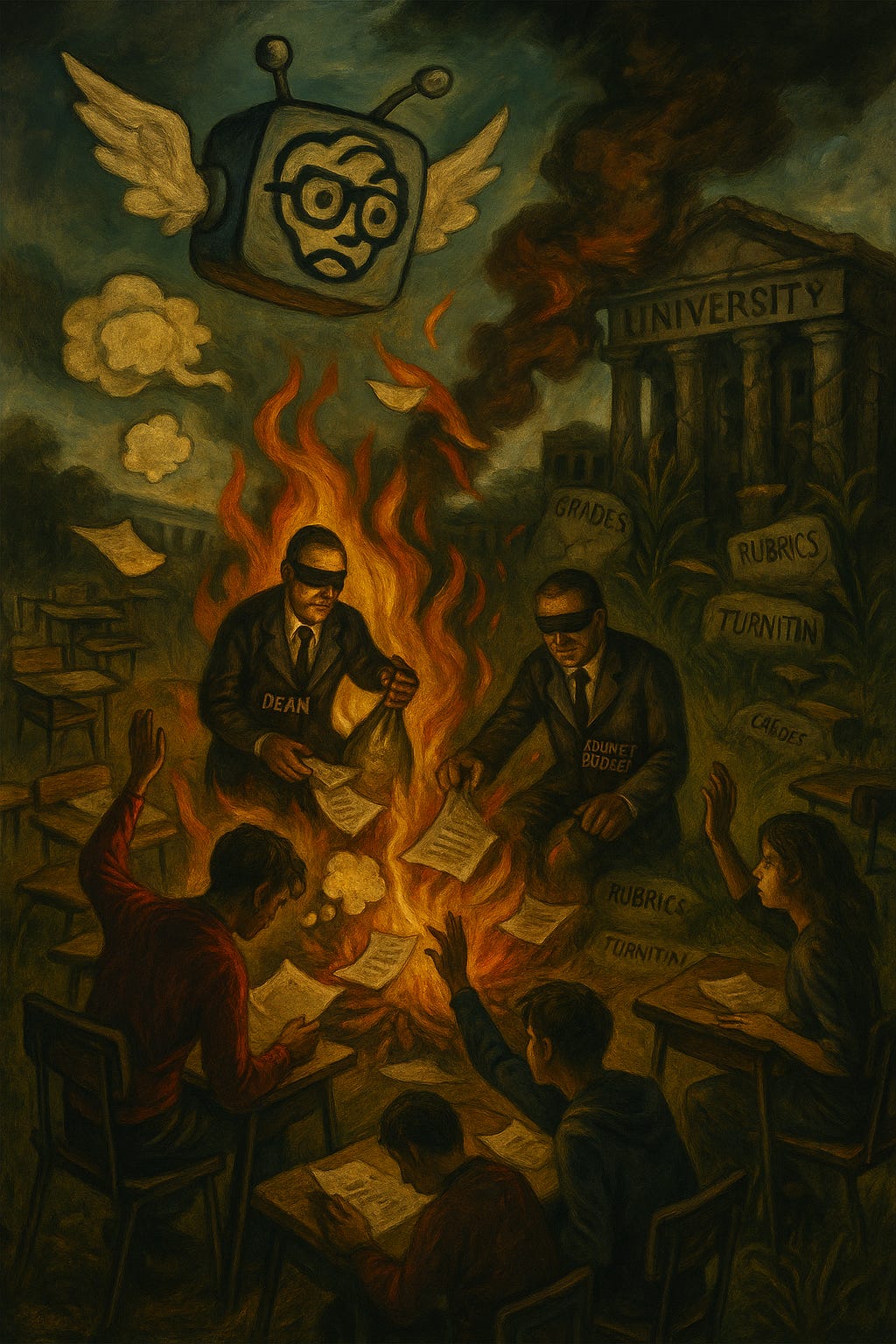The Credentialist Con: AI, Universities, and the Death of Learning
If you believe in the importance of free speech, subscribe to support uncensored, fearless writing—the more people who pay, the more time I can devote to this. Free speech matters. I am a university professor suspended because of a free speech issue, so I am not speaking from the bleachers. The button below takes you to that story.
Please subscribe to receive at least three pieces /essays per week with open comments. It’s $6 per month, less than USD 4. Everyone says, "Hey, it’s just a cup of coffee," but please choose my coffee when you come to the Substack counter. Cheers.
Much of the modern university has become a bloated credential mill, churning out degrees like many widgets on an assembly line. The panic over artificial intelligence—Chatgpt and its ilk—reveals not a crisis of technology but a deeper rot: the thoughtless surrender of education to the gods of credentialism.
Administrators and faculty, complicit in their silence, have allowed learning to be replaced by a grim pantomime of grades, bums in seats, and tuition dollars. The hysteria over AI is merely the latest symptom of a disease that has metastasised for decades, and the irony is as bitter: universities fear AI not because it undermines learning, but because it exposes how little learning was happening in the first place.
Consider the student who pours 700 words of raw ideas into Chatgpt, asking it to refine and expand them into a 1000-word essay. Is this cheating? Or take the diligent soul who runs their essay through AI for spelling and grammar corrections, only to trip the same AI detectors that flag the lazy plagiarist who copy-pastes an entire assignment.
The detectors, blunt as a bureaucrat’s soul, cannot distinguish between these acts. This is not a flaw in the technology but a mirror held up to the university’s failures. If education were about fostering critical-thinking skills, using AI as a tool, whether for organising thoughts or polishing prose, would be a non-issue. Instead, the obsession with catching “cheaters” reveals a system that values compliance over creativity, rote memorisation over reasoning.
The stats are damning. Studies like those by Arum and Roksa (2011) in Academically Adrift show that 45% of college students demonstrate no significant improvement in critical thinking, complex reasoning, or written communication after two years of study. By graduation, a third still show no gains. Worse, research by Blaich and Wise (2018) indicates that students one year out of a course perform no better on subject-specific assessments than those who never took it. The university seems to be where knowledge dies, replaced by the ritual of “presenting content” from publisher-provided test banks and PowerPoint slides. These are not tools of education but props in a farce, where instructors, many of whom have never worked in, studied, or even read the textbook for their assigned subject, teach students not to think but to game the system.
This is the real scandal, and it predates Chatgpt. For years, I fought a quixotic battle against using publisher test banks. These glorified glossaries, with their multiple-choice questions designed to test memorisation of terms rather than understanding, were not just lazy; they were corrosive. Armed with the same online answer keys as their instructors, students learned not marketing or finance but how to cheat efficiently. The implicit message was clear: education is an obstacle course, a toll booth to a career, not a pursuit of truth.
When I protested, I was told to shut up—one professor, who had never worked a day in the field he “taught,” threatened to file a complaint for questioning his “integrity.” His integrity, it turned out, consisted of ladling out grades and killing time for 12 weeks, secure in the knowledge that a 10% grade bump would silence any student pushback. Hypocrisy wafts through the lecture halls like cheap cologne, and students, with their keen noses, smell it from a mile away.
The AI panic is a distraction from this deeper betrayal. Banning Chatgpt or policing its use with detectors is like using a lawnmower to deal with dandelions.
AI is a tool, not the enemy. It can be a research aid, a writing coach, or a brainstorming partner. The problem is not that students use it but that they’re incentivised to use it as a shortcut. Why wouldn’t they, when the system rewards grades over growth? Management’s silence on learning’s decline—their obsession with enrollment numbers and their willingness to hire instructors who treat teaching as a side hustle—ensures that the classroom is where passion withers. The most bored person in the room is often at the front, droning through slides they didn’t create about a subject they don’t care about.
So what is to be done? The answer lies not in banning AI but in reimagining the classroom as a place where intrinsic motivation is nurtured, not crushed.
Studies, like those by Essel et al. (2024), suggest that interaction with Chatgpt can enhance critical, reflective, and creative thinking when guided by active pedagogical strategies. For example, at Georgia Gwinnett College, students used Chatgpt in chemistry courses to draft essays, revise outputs, and validate information, significantly improving their confidence to ask insightful questions and analyse complex concepts (Guo & Lee, 2023). The key was structured engagement: students were not left to flounder but guided to use AI as a tool for deeper inquiry.






